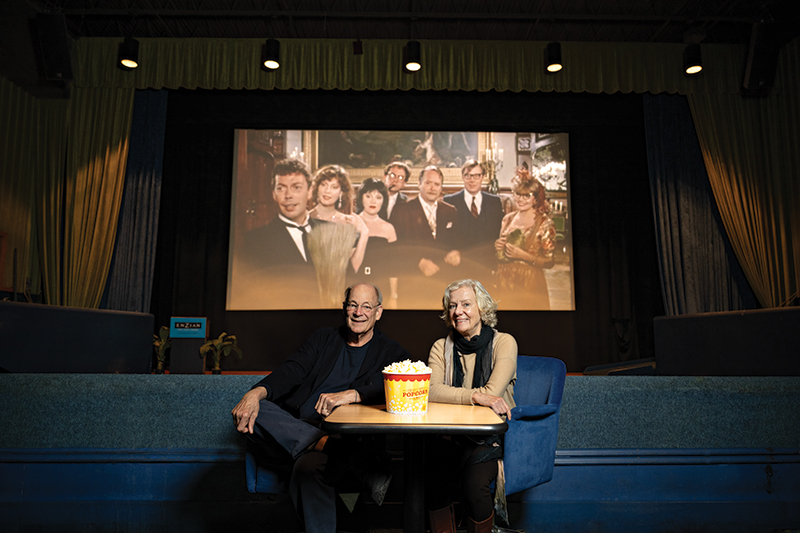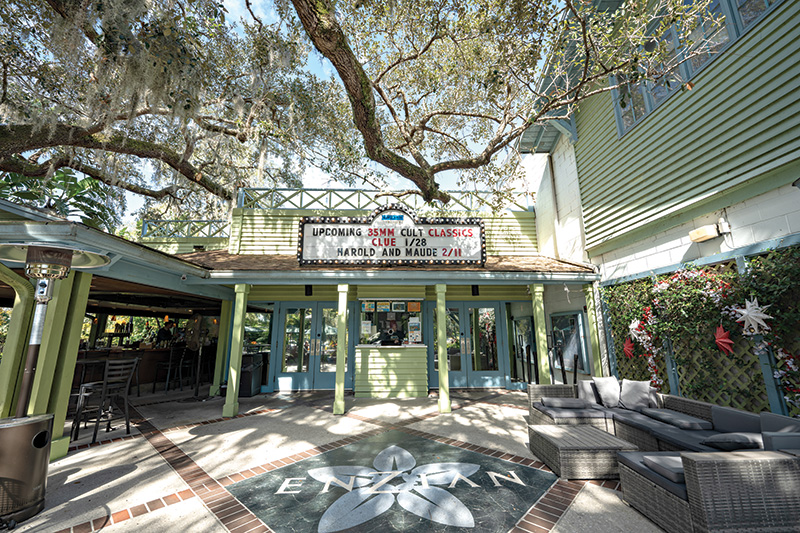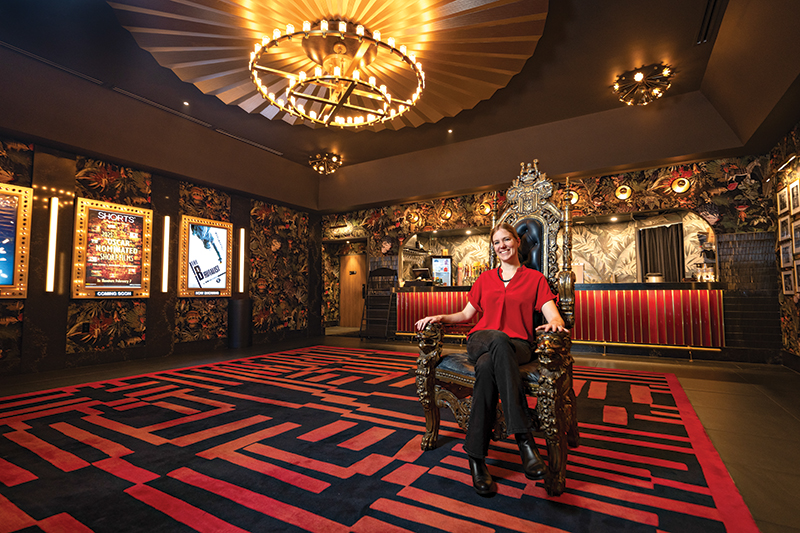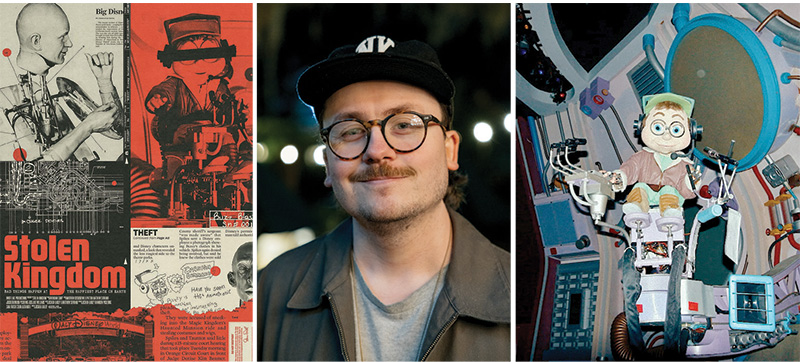
If you’re into movies that don’t necessarily feature costumed comic-book superheroes and exploding galaxies—that is, sometimes under-the-radar flicks that tell compelling stories about real human beings—then chances are you’ve visited Enzian.
Maybe you’ve also attended the prestigious Florida Film Festival, held in partnership with Full Sail University, which the Maitland arthouse cinema hosts each spring. Or you’ve dropped by the attached Eden Bar, an open-air eatery and watering hole set beneath live oaks and lush foliage—and then become curious about the films inside.
Still, you may not realize that the warm and welcoming single-screen nonprofit venue—which shows everything from indies to documentaries to cult classics—is celebrating its 40th anniversary this year. And the 10-day film festival, set for April 11 to 20, is marking 34 years of spotlighting big-screen excellence.
My, how time flies when you’re having fun (which patrons most certainly do). Enzian, set on 3.5 exuberant acres at 300 South Orlando Avenue, is routinely ranked among the region’s most cherished cultural jewels. It’s a hangout where both serious cinephiles and casual movie-lovers mix and mingle in a cozy setting that no multiplex could duplicate.
Roger K. Thompson, a co-founder of Olive Garden and a retired senior vice president of Darden Restaurants, has served on the nonprofit theater’s governing board for some 30 years and has chaired it since 2023. But he’s been a fan and a customer almost since the very beginning.
Thompson notes that he came to Orlando after living in Minneapolis and Chicago, where cultural amenities abound. “But neither bigger city had anything like Enzian,” says Thompson, who also credits the deceptively modest venue with building social connections in a sharply divided society.
“People see films at Enzian that touch both the heart and the head,” he notes. “You want to talk about what you’ve just seen. When I step outside after a showing, I love to see people gathering at Eden Bar, building new friendships and connecting over something significant.”
Last year, Enzian—with an annual budget of about $3.6 million—screened nearly 500 films and hosted nearly 70,000 people in its 210-seat theater, where patrons sit at tables and may order food from Eden Bar and drinks from a newly remodeled indoor lobby that features full liquor service.
(Long-timers will remember that an existing adjacent restaurant, Chef Mark Rodriguez’s Jordan’s Grove, previously supplied made-to-order meals for guests of Enzian. But after that eatery and several successors closed, the theater opened Eden Bar in 2008.)
These days many folks seem to believe that Enzian, like several other cultural attractions in and around Winter Park, has been around almost forever. However, there would have been no theater without the Tiedtke (pronounced TEEDT-key) family, whose history of arts philanthropy spans generations.
The operation was, in fact, the brainchild of Tina Tiedtke, daughter of John M. Tiedtke, the benefactor whose name adorns Tiedtke Concert Hall at Rollins College. In Tina’s travels, she had seen art house cinemas and had decided, in typical Tiedtke fashion, that such a place was needed in Central Florida. Then she set about making it happen.
HOLY TOLEDO!
John Tiedtke was the scion of a family that made its fortune in Toledo, Ohio, with Tiedtke’s, a combined supermarket and department megastore. When the business was sold, the Tiedtkes, formerly snowbirds, built a home in Orlando in 1925.
Tiedtke earned a master’s degree in 1930 from Dartmouth College’s Tuck School of Business Administration and managed the family’s agricultural enterprises in South Florida. He also began investing in sugar, citrus and corn farmland near Lake Okeechobee and even patented a cane loading and chopping machine.
A wealthy man, Tiedtke certainly didn’t need a steady paycheck to earn a living. But he taught photography and economics at Rollins (where he had studied piano briefly in the early 1920s) and later became the college’s business manager, second vice president and dean of its graduate programs before transitioning to its board of trustees.
Among those benefiting from Tiedtke’s generosity were the Bach Festival Society of Winter Park—which he chaired until his death at age 97 in 2004—the Florida Symphony Orchestra, Orlando Museum of Art, Orlando Opera and the Festival of Orchestras. He was also a founding funder of United Arts of Central Florida.
Tiedtke was, in later years, quoted as saying that he didn’t particularly care about movies. However, he backed Tina’s passion project, which opened in February 1985 in a new cottage-style building next to what was then a Japanese restaurant. The first flick was D.W. Griffith’s silent classic, Broken Blossoms, with its star, Hollywood legend Lillian Gish, in attendance on opening night.
Tina spoke enthusiastically to the late Jay Boyar, then movie critic for the Orlando Sentinel, about the remainder of the films slated for February and March, which included everything from the Hitchcock thriller Strangers on a Train to the gangster songfest Guys and Dolls along with some foreign films such as Fellini’s Orchestra Rehearsal.
“I’m very excited about what’s going on,” said Tina. “I’d like to do some really unusual things.” Unfortunately, however, Enzian’s founder was diagnosed with debilitating health issues and was no longer able to work. Tina’s brother, Philip, and his wife, Sigrid (usually called Sigi), eventually stepped in after a succession of general managers lost money on the operation.

“My dad said fix it or shut it down,” according to Philip, a graduate of the Stanford University Film School who soon found that the traditional repertoire model used by art house cinemas—constant rotation of old movie classics—was outdated by the late 1980s. “We had taken over a dinosaur.”
The key to sustainability, Philip believed, was showing new indie films that couldn’t be seen in most mainstream theaters—and certainly not on television during the pre-streaming era. His point was proven when Tie Me Up, Tie Me Down, a Spanish-made black romantic comedy that was rated NC-17, drew packed houses in 1989.
Then, as the programming philosophy shifted, Philip and Sigi came up with another idea that would both fill a cultural void and draw more attention to the theater. They founded the first Florida Film Festival, which, if past performance is any indicator, will this year present some 190 films in various genres and draw more than 15,000 attendees.
Dubbed “the grande dame of film fests in the Sunshine State” by Indiewire, a website that caters to independent filmmakers, the event is one of only a handful of film festivals in the world—and the only one in Florida—to be accredited as a qualifying festival for the Oscars in three short-film categories: Live Action, Animation and Documentary.
Another core function of the festival is operating as a theatrical think tank for independent filmmakers via its critical partnership with Full Sail, which is internationally renowned for its programs in new media and entertainment technology. The Winter Park-based school participates in developing and staging filmmaking seminars during which its students and others can meet the pros and glean their wisdom.
Since the festival began, stars have been born, minds have been blown and memories have been made. For instance, on opening night, June 5, 1992, there was a bomb threat, apparently inspired by the presence of controversial director Oliver Stone, whose most recent film, JFK, had caused an uproar by alleging conspiracies around Kennedy’s assassination.
Organizers had lured Stone to Central Florida with the promise of an accolade—the inaugural John M. Tiedtke Award for directorial excellence—as well as a personally guided tour of Universal Studios (then a major festival financial sponsor) for Stone and his entourage, which consisted of his mother and his 7-year-old son. The iconoclastic Oscar-winner was, according to media reports, sometimes gruff and sometimes gracious.
A surprise opening-night guest was the far less incendiary—and far more dreamy—Paul Newman. Philip had personally invited Newman to attend when both were enjoying a sports-car race at Road Atlanta. “Paul didn’t commit right away,” recalls Philip. “Months later, the morning before the festival’s opening, I get a call from Paul. He asked jokingly if it would be OK if he came to the festival the next day.”
The iconic actor—whom Philip knew through their mutual friendship with Orlando-born stuntman and race-car driver Michael Brockman—loved Enzian and for years thereafter sent 50-pound bags of his branded popcorn to the theater. He, among other industry luminaries, also served on the festival’s National Advisory Board. (The board, largely honorary, includes such famous names as Bob Balaban, Diane Ladd and Shirley MacLain.)
Frequent festivalgoers have watched Cloris Leachman blend B-52 shots behind the Eden Bar and have rubbed elbows with the likes of Billy Crudup, Peter Fonda, Robert Hays, Tippi Hedren, Florence Henderson, Dennis Hopper, William H. Macy, Susan Sarandon and Christopher Walken.
And who can forget when Janet Leigh, the Psycho star, was introduced after stepping from a bathtub behind an onstage shower curtain? Central Florida’s own Blair Witch Project, created by five UCF graduates, caused a sensation (and became Oscar eligible) when it premiered at the 1999 festival, just prior to its national rollout.

Sure, the festival has faced its share of hurdles. But the show must go on—and, in fact, did go on even during pandemic-plagued 2020, although the date was pushed back to August and a variety of virtual viewing options were offered. Such an outside-the-box response was indeed innovative but failed to replicate the convivial vibe that had become a signature of the in-person event.
Normalcy had returned by 2022, however, when William Shatner beamed up for a screening of Star Trek IV: The Journey Home. John Cusack was the headliner in 2023, when his 1989 teen romantic comedy, Say Anything, was revisited. Last year, comedic icon John Cleese attended a screening of Monty Python and the Holy Grail and hosted a question-and-answer session afterward.
The 2025 festival will get underway at the Tiedtke Amphitheater and Belvedere at the Winter Park Events Center with an Opening Night Party. The event is slated for Friday, April 11, and the opening-night film will be Stolen Kingdom—a documentary about extreme Disney fans and their clandestine efforts to acquire on-site memorabilia—directed by Winter Park resident Joshua Bailey. (See page 56.)
Philip and Sigi’s daughter, current Interim Managing Director Elizabeth Tiedtke Mukherjee, had just turned 6 when the festival opened. “I remember getting to help hold doors open and in later years, pass out golf pencils for the ballots or count heads as people came in the door,” she says. “Growing up alongside the festival has been a unique experience.”
FAMILY LEGACY
Phillip and Sigi—major arts philanthropists in their own right—remain closely involved, but the day-to-day operation of the family business is now the responsibility of Elizabeth (usually called Liz). “I prefer to think of it as the family legacy,” says Liz, who first ran the theater from 2010 to 2021.
Liz, who studied acting for a year at NYU after graduating from Trinity Prep, earned a bachelor’s degree in economics from Rollins and then spent another year in New York at SoHo’s French Culinary Institute. In 2022, she returned to NYU’s Stern School of Business to earn a master’s degree in qualitative management.
She and her husband, Orlando attorney Gourav Mukherjee, have four children: three boys, ages 9, 7 and 3, and a girl approaching her first birthday. She notes, perhaps only half kidding: “Maybe we have another generation of theater managers coming up.”
With older brother Alex, Liz recalls romping around the theater as a youngster, when she attended next-door Park Maitland School, snatching chocolate-chip cookies from the kitchen and using movie fliers from her mother’s office as coloring paper. (She admits that the Frisbee-like flinging of round cardboard pizza trays into the rafters may also have been involved.)
One of Liz’s more vivid teenaged memories involves being playfully threatened by actor Steve Buscemi (Fargo, Boardwalk Empire), who was in town to pick up the festival’s 1998 Special Achievement Award. Buscemi and his wife took her to Universal Studios, where she was selected for the “Ren & Stimpy Ring Toss” and picked Buscemi as her partner.
“I had these big foam rings and he had to crouch in a fake litter box and wear a Stimpy head,” she recalls, cringing even as she laughs. “I had to throw rings around his neck, which was just horrifying for me.” At the end of the festival, he wrote in her program, “I’ll get you back some day. Much love, Steve.”
Even as a child, Liz worked at Enzian, running assorted errands and one year playing the role of “festival muse,” whose primarily duty was to charm participants and attendees. At age 15, she took a proper job in the box office. Over the years, she has also been a cook, projectionist, house manager and, briefly, events coordinator.
In 2010, Liz became the theater’s director of operations; two years later her official title became executive vice president and managing director. She left her post in 2021 to complete her master’s degree but returned as the volunteer managing director in 2023.
There have been several major challenges during her tenure, most notably a fraught expansion plan called “Enzian Forever” and the existential threat posed by COVID-19.
The expansion plan, a $6.5 million undertaking that would have added two more screens and increased the theater’s size from 9,439 to 25,174 square feet, was withdrawn over potential parking issues in 2018. Two years later, with the pandemic casting a pall of uncertainty, a less ambitious effort that would have added a single 50-seat screening room without altering the theater’s footprint was also scuttled.
“We raised a lot of money during ‘Enzian Forever,’” says Allan E. Keen, chair of the governing board from 2014 until Thompson’s current term. “When the project didn’t go forward, we offered to return the money to every donor. It says a lot about this place that about 85 percent of the donors said, ‘Keep the money and use it for something else or something later.’”
So a portion of the funds were deployed for remodeling the bathrooms and building an indoor bar so patrons seated in the theater could order libations instead of choosing from the previous beer-and-wine-only menu. The refreshed lobby and its new bar were dubbed, with a wink and a nod, “Keen’s Purgatory” in honor of Keen and his wife, Linda.
Chairman and owner of The Keewin Real Property Company, Keen wasn’t a major movie buff when he joined the board but had served as a Rollins trustee with John Tiedtke and was a longtime friend of Philip and Sigi. “I wasn’t looking to do this,” adds Keen, who admired Enzian’s unusual programming and appreciated the theater’s value as a community cultural asset. “I had started to scale back my activities and the only two things I kept were Rollins and Enzian.”
As for COVID-19, it was a particular gut punch to movie theaters (and to indoor entertainment venues in general), which depended upon people being able to gather in confined spaces. The theater had to close on March 17, 2020—no one really knew for how long—and began offering outdoor “drive-ins” and ticketed films on demand to home streamers.
The film festival was moved to August (fingers crossed) and the theater reopened at half-capacity four months later—but cautious patrons were slow to return, and the revenue hit was huge. Says Liz: “I think we made it through the pandemic because of our dedicated and passionate staff.” Adds Keen: “The Eden Bar carried the theater for a long time. Because it was outdoors, it was open when the theater couldn’t be.”
Now, having survived that near-catastrophe, Enzian officials are no longer talking much about expansion—although they still hope that a way can be found to add a second screen. Neither are they talking about seeking other locations for offshoots since replicating the unique setting—a key part of the theater’s appeal—would likely be impossible.
Instead, they’re laser focused on upgrades and on being the best single-screen art house cinema in the country. “We are quite the unicorn in many ways,” says Liz. “We’re a one-screen facility with a full kitchen. We’re a film festival house with a year-round footprint. Right now, we’re leaning into that.”
Liz, who also serves on the Enzian board of directors, insists that the word “interim” is in her title for a reason. “My wish for Enzian in the next year is to be able to bring it from a great place that does great work to a new level of success,” she says. “I want it to be able to sustain itself without needing me.”
ECLECTIC OFFERINGS
While Enzian’s ambiance keeps some patrons coming back no matter what’s showing, the theater is known for its creative, innovative and eclectic movie lineup. That’s largely thanks to Matthew Curtis, who has been program director since 1987. He had worked with the theater even prior to that, when he rented oldies to the fledgling operation through his job at Corinth Films, a distributor based in New York City.
“I often say that if you like everything we book at Enzian, then we haven’t done our job,” says Curtis, referring to the variety for which the theater is known. Curtis has also created ongoing programs that group films by genre: Cult Classics, Peanut Butter Matinees, Freaky Fridays, Music Mondays and special series built around holidays such as Halloween and Christmas.
A new series, appropriately titled Uncomfortable Brunch, “juxtaposes a pleasant social activity (eating brunch) with an unpleasant social activity (watching an uncomfortable, but important film),” according to Curtis, who has scheduled films for the series that were acclaimed by critics but contain often graphic content that’s all but guaranteed to make viewers squirm, blush or both.
In addition to the big annual film festival, Enzian hosts smaller but equally meaningful events such as the Reel Short Teenage Film Festival, the South Asian Film Festival, the Jewish Film Festival and the Brouhaha Film & Video Showcase, which features the best work from film-school students and independent filmmakers statewide.
Perhaps of more interest to enthusiasts, Curtis says, is the fact that titles shot on actual film—movies these days are typically shot on digital cameras—are shown at the theater using old-school 35mm projectors. To those attuned to such matters, 35mm film can have a more nuanced tonal range and subtle grain structure.
Notes Curtis: “Seeing a movie shot on celluloid, as it was intended to be seen, is something much of our audience loves.” There’s only one theater in Central Florida where such an experience is possible—and by now you surely know where that is.
Enzian’s anniversary, though a milestone, will be relatively low key. In February, the theater threw its first fundraising event, the James Bond-themed Casino Royale Gala, at a private home in Winter Park. In addition, each month the theater will show a film from 1985 during one of its series.
Surprisingly, 1985 was a good year for movies. Up next is Pee-Wee’s Big Adventure at a Peanut Butter Matinee on Sunday, April 27 at noon. For more information about future films, call 407-629-0044 or visit enzian.org.
FESTIVAL TIME! WHAT TO KNOW
The Florida Film Festival’s Opening Night Party will be held at Tiedtke Amphitheater and Belvedere at the Winter Park Events Center, 1050 West Morse Boulevard. It will include food and friends with craft cocktails and cuisine from local vendors accompanied by live music.
Tickets for the belvedere bash, which runs from 8 p.m. to midnight, are priced at $75, while VIP passes—which range in price from $100 to $175—include the gathering as well as access to a private bar and either a screening at Enzian or one of possibly two screenings at the Regal Winter Park Village for Stolen Kingdom.
Matinee passes for all eligible films (about 160 showings are expected over the festival’s 10-day run) are priced at $125, while “binge” passes for evening films are priced at $350. Film-lover passes, which are priced at $675, offer early entry and access to exclusive parties.
Special events with celebrities—which are yet to be announced—will require a separate ticket.. For more information, call 407-629-1088 or visit floridafilmferstival.org.

THE FLOWERING OF AN ENDURING STORY OF LOVE
John M. Tiedtke’s love of the arts drew him close to people of similar tastes. His wife was raised alongside the Danube, in the City of Music, home to Haydn, Mozart, Beethoven and Schubert.
Her name was Sylvia Southard—and she was the daughter of a princess, Austrian heiress Fay Schoeller, and the stepdaughter of a prince, Prince Alfred of Hohenlohe-
Schillingsfürst. She had grown up shuttling back and forth between Vienna and the family’s fairytale castle, Schloss Friedstein, high in the Austrian Alps.
In February 1945, as World War II was drawing to a close, her family sent her away to a German city that they hoped would be a safe haven for the duration of the war: Dresden.
It was just as her train pulled into the station that the bombs began to fall. The city was being firebombed by the Allies in one of the most devastating aerial assaults in history, one that immolated a half-million civilians. Sylvia, a U.S. citizen, survived, barely, after being trapped beneath the train station’s rubble for two days.
Sylvia met her future husband after the war while visiting relatives in Winter Park. They married in 1948, and one of Sylvia’s favorite activities was taking their children on hikes through the mountain passes, enjoying the wild Alpine flowers they saw along the way. Among them was a rare, velvety blue, trumpet-shaped bloom called enzian.
In 1985, when Tina Tiedtke took up the cause of creating an alternative art-movie house for Orlando, the seed money for the enterprise came from her father, while its name owed its inspiration to the rarest of the flowers that she’d seen on those mountain treks with her mother. It’s a fascinating backstory. Somebody ought to make a movie about it.
—Michael McLeod

THE SEAMY UNDERBELLY OF MOUSE MERCH
Everyone in Orlando likely knows one or more Walt Disney World superfans who hoard memorabilia and obtain second mortgages on their homes to fund annual passes. We may not entirely understand such behavior, but we accept it as innocent, if more than a little quirky. And so it is—except when it isn’t.
Joshua Bailey—writer, director and producer of the 2025 film Stolen Kingdom—discovered a thriving black market for, well, unusual Disney-related collector’s items. The suppliers were rulebreakers whose methods for acquiring their verboten inventory were decidedly mysterious (and usually illegal).
The resulting 74-minute documentary was previously shown at Montana’s Big Sky Documentary Festival and then the Slamdance Film Festival in Los Angeles. Stolen Kingdom will be screened locally on Friday, April 11, on the opening night of the annual Florida Film Festival.
Showtime is 6:30 p.m. at Enzian in Maitland (doors open at 6 p.m.) and 7 p.m. at nearby Regal Winter Park Village. A second viewing at Regal may be slated for 9 p.m. if ticket sales are as strong as anticipated. Bailey plans to attend one or more times to meet patrons and answer questions.
“It’s a fun, fascinating story that couldn’t possibly be more local,” says Tim Anderson, now in his 13th year as the festival’s programming coordinator. Anderson, who saw a first cut of Stolen Kingdom in 2023, has been eager to book the film ever since.
Bailey, a Winter Park resident who attended (but didn’t graduate from) Valencia College’s Film Production Technology program grew up in Tampa and was fascinated as a youngster by all things Disney. As an 18-year-old, he twice worked as a “cast member” (as Disney refers to all employees) at the Magic Kingdom and Epcot Center.
Later, though, Bailey became intrigued by the exploits of a small army of “darkside urban explorers” who somehow gained access to behind-the-scenes areas and snatched props, costumes and, most famously, an animatronic figure named “Buzzy” who was somehow kidnapped from a now-closed attraction called “Cranium Command” at Epcot.
Bailey and his small team penetrated this underworld of oddballs and gained the trust of its leaders, including Patrick Spikes, who was previously known only as “BackDoorDisney” via his social media accounts. (During the filming of Stolen Kingdom, Spikes was arrested and charged with grand theft by the Orange County Sheriff’s Office. He remains on probation and is banned from Disney property.)
“We knew this had to be a documentary,” says Bailey, who estimates that the film—auspiciously, his very first—cost about $150,000 to complete. “I wanted to meet these people and understand how they work. It turned out to be a wild ride.”
He adds that Disney is, by now, likely aware of his passion project, but probably considers it to be only “a minor annoyance” since many of the individual incidents described have already been reported publicly. Plus, he’s quick to point out, Stolen Kingdom is a cautionary tale (remember what happened to Spikes) and absolutely does not condone illegal activity.
Other team members responsible for the film include Jake Williams, executive producer, who is a YouTube creator with a penchant for documenting abandoned places (particularly shopping malls); and Brandon Pickering, the cinematographer, who is a native of Central Florida but now lives in Brooklyn.
Wrote one reviewer in Montana: “The exciting footage throughout Stolen Kingdom, and its use of primary sources to examine urban exploration at Disney, makes this a much-needed watch for anyone with knowledge of the parks. Examining the subcultures in the shadows of the Happiest Place on Earth will always be worth our time.”
